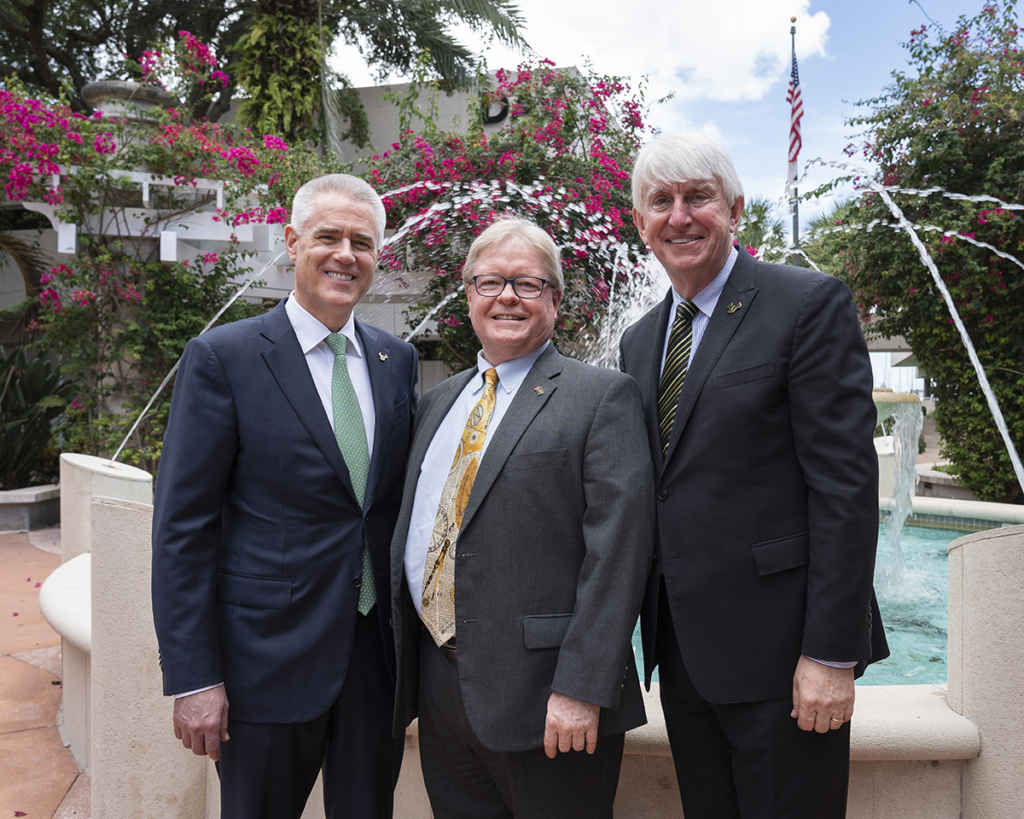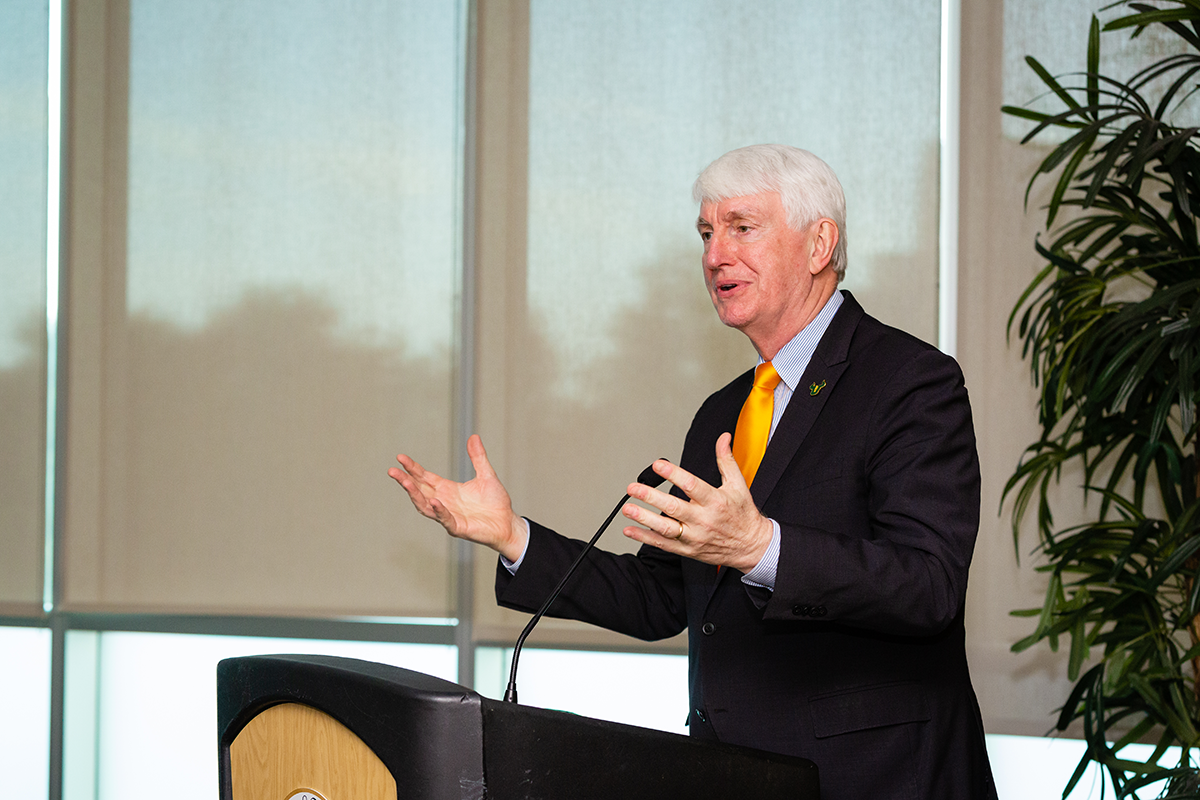Pictured above: Wilcox once helmed the USF St. Petersburg campus prior to becoming provost in 2008 under the Judy Genshaft administration.
Courtesy of USF
By Annalise Anderson
After 13 years full of momentous highs and troubling lows, USF Provost Ralph Wilcox announced he will step down from his role next year.
Wilcox plans to remain at USF as a professor, citing a desire to spend more time with family as his reason for stepping down. He agreed to remain in his role for as long as necessary to help with the university’s transition into new leadership.
The search for Wilcox’s successor will begin in the spring, shortly after the university completes its presidential search and names its eighth president.
Wilcox announced his decision in a letter to USF faculty and staff on Nov. 8. (Read the full letter below.)
“Serving as provost and executive vice president at USF since January 2008 has been the greatest privilege of my professional career,” Wilcox wrote. “As I reflect on where we are today, I can say with the utmost confidence that USF’s position has never been stronger, especially given our gains in student success, faculty accomplishments and, most recently, consolidation.
“Our national and international stature is stronger than ever, which is proud testament to the remarkably talented people at USF – our faculty, staff, leadership, students, alumni, donors and friends of the university.”
Shortly after the announcement, Interim President Rhea Law addressed Wilcox’s decision in an email to the USF community.
“We are deeply grateful to Provost Wilcox for his many contributions to USF’s outstanding momentum,” Law wrote in the email. “Under Provost Wilcox’s leadership, USF’s academic enterprise has earned widespread recognition across the state, the nation and globally. His comprehensive approach to student success has made an impact on hundreds of thousands of students over the past decade.”
Law thanked Wilcox for “his leadership, commitment and tireless contributions” to USF’s status as U.S. News & World Report’s fastest-rising university and his drive for USF’s designation as a preeminent research university.
Law noted increases in first-time-in-college and transfer graduation rates, freshman retention, enrollment diversity and decreased average tuition costs as some of the university’s accomplishments under Wilcox’s leadership.
St. Petersburg Regional Chancellor Martin Tadlock commended Wilcox’s ambition for USF.
“I appreciate Dr. Wilcox’s many years of dedicated service to USF. He always believed in our university’s potential for greatness and held everyone to a high standard of excellence, including himself,” Tadlock said in a statement to The Crow’s Nest. “Through his discipline and his drive, Dr. Wilcox helped us become America’s fastest rising university. I am thankful for his leadership and wish him all the best in his next chapter.”
Some may be surprised to know that, prior to becoming provost, Wilcox helmed the St. Petersburg campus for one year.
When Genshaft ousted Bill Heller, the campus’ longtime chief executive, in 2002, she put Wilcox in his place with the title of interim vice president and campus executive officer.
Wilcox has listed several accomplishments made during his year in St. Petersburg, including helping establish a unique campus identity through programs of distinction; initiating plans for on-campus student housing, a campus welcome center, a student health center and a parking garage; and increasing the number of faculty from 124 to 171.
Wilcox was appointed provost in 2008 under the Judy Genshaft administration and remained in the role throughout the brief, but tumultuous, Steve Currall administration.
When Currall replaced Genshaft as president in July 2019, one of the first things he did was extend Wilcox as provost for five years at an annual salary of $471,203.

Clashes on the campuses
Despite Tadlock’s praise, Wilcox has sometimes been viewed as an obstacle to maintaining USF St. Petersburg’s unique campus identity.
While Wilcox oversaw the consolidation of USF’s three campuses under former presidents Judy Genshaft and Steve Currall, many USF St. Petersburg campus and community leaders were concerned that the smaller campus was being unduly diminished.
Genshaft told USF’s Board of Trustees in early 2019 that the St. Petersburg campus could become “something in-between” a full branch campus and an instructional site. An instructional site is generally less prestigious than a branch campus with faculty research as a lower priority.
Later that year when Currall became president, his administration issued its consolidation plan, which didn’t go over well on the St. Petersburg campus.
Ray Arsenault, then-president of the St. Petersburg Faculty Senate, which was dissolved after consolidation, said Currall’s plan was “in defiance” of the Legislature that established St. Petersburg and Sarasota-Manatee as branch campuses with their own budgetary and hiring authority and their own faculty and administrative organization.
“The way consolidation is going for us is a disaster and removes all academic decision-making over here [at USF St. Petersburg],” Arsenault said.
Although Currall issued a revised consolidation plan in October 2019 that was applauded in St. Petersburg, concerns at the campus continued.
Wilcox told trustees in November 2019 “what’s apparent as we wrestle with challenges to dismantle three institutions and rebuild into one is the need for one budget in one university” — even though state law says each of the USF campuses after consolidation should have its own annual operating budget.
Sen. Jeff Brandes, R-St. Petersburg, who helped orchestrate consolidation, said in 2020 that’s not going to happen.
“I have no doubt that they would like to have one single budget, but the law clearly states that there should be three budget lines,” Brandes said. “We’re not going to let them consolidate budgets. I’m telling you that USF needs to follow the law, period. And the law is very clear.”
In September, the initial results of a faculty-led survey sent to all university faculty at the end of the spring 2021 semester revealed that 72% of respondents felt negatively impacted by consolidation.
On top of feeling shafted by consolidation, St. Petersburg continues to earn lower salaries than Tampa faculty, according to a United Faculty of Florida report. Salary inequities have also been identified at the Sarasota-Manatee campus.
Beyond St. Petersburg, Wilcox was in the midst of other recent university mishaps.
Wilcox became the face of USF’s controversial proposal to close the College of Education when he sprang the news on faculty during a meeting in October 2020. The proposal suggested the college become a graduate school to help save the university $6.8 million over two years.
Students, graduates and faculty at the College of Education – joined by district school superintendents, school boards and elected officials – denounced the move as hasty and shortsighted.
Despite administration backtracking and announcing in January that the college would remain intact, education faculty issued a statement asserting that trust between the faculty and administration “has been irreparably broken.”
The College of Education debacle, in addition to controversy over a substantial budget deficit outlined by former-President Currall, led faculty to discuss a vote of no-confidence in the Currall administration earlier this year.
In May, Faculty Senate President Tim Boaz confirmed that talk of a no-confidence vote had come up amid concerns about “communication failures” by the administration. But he said he is “not a big fan” of such votes.
“I am certain that there are people who are thinking about that [vote of no confidence] as an option,” Boaz told The Crow’s Nest. “I would much prefer to engage the administration in conversation, try to come to some mutually agreeable solutions for the problems that we have, and work in that manner rather than making a dramatic, negative public statement.”
An ongoing shift
Wilcox is included in the list of the several upper-level members of USF administration who recently left, or plan to leave, their positions:
**Former-President Steve Currall announced his sudden retirement from the presidency this summer. Serving only two years in the role, Currall’s tenure is the shortest in USF history.
**St. Petersburg Regional Chancellor Martin Tadlock will step down from his position next summer to return to the College of Education. Tadlock initially planned to step down in December but agreed to extend his position after Currall announced his retirement.
**Former-USF Vice President and Chief Operating Officer David Lechner announced his retirement from the university in May. He was a driving force behind the university’s look into developing 769 acres of preserved land adjacent to the Tampa campus.
**Cecil Howard, USF’s former associate vice president for diversity, inclusion and equal opportunity, resigned in July after rebuking Currall for his reconfiguration of the Office of Diversity, Inclusion and Equal Opportunity.
**Most recently, St. Petersburg Director of Student Life & Engagement Dwayne Isaacs announced that he would end his 21-year journey with USF in January to pursue a similar role at University of Florida.
Read Provost Ralph Wilcox’s Nov. 8 letter below:
2021-1108-a-message-from-the-provost-2


